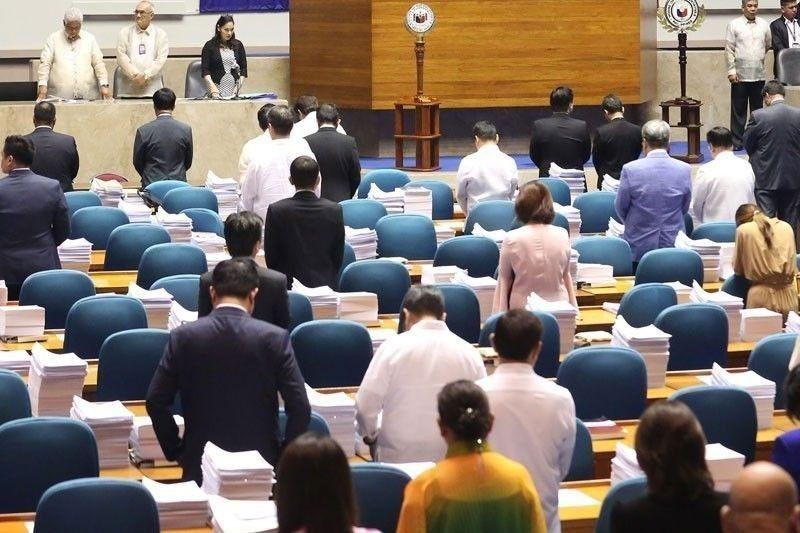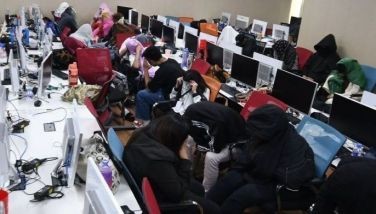Senate VFA review starts today

MANILA, Philippines — Senators begin today their review of the country’s military deals with the United States, one of which the Visiting Forces Agreement (VFA) President Duterte wants revoked.
The Senate foreign relations committee chaired by Sen. Aquilino Pimentel III will spearhead the review at a public hearing. Aside from the VFA, the panel and invited resource persons will discuss the 1951 Mutual Defense Treaty and the Enhanced Defense Cooperation Agreement (EDCA).
Also to be tackled at the hearing is the resolution jointly filed by Senate President Vicente Sotto III, Minority Leader Franklin Drilon and Sen. Panfilo Lacson, urging the President to abandon his plan to have the VFA abrogated. Duterte declared he would move for the abrogation of the VFA in response to the cancellation of the US visa of long time ally Sen. Ronald dela Rosa.
Pimentel said the committee has invited several resource persons, including officials of various government agencies like Foreign Affairs, National Defense, National Economic and Development Authority, National Intelligence Coordinating Agency, National Security Adviser (NSA) and the Armed Forces of the Philippines (AFP).
“We are exercising also our oversight function, subject matter treaties,” Pimentel said.
In their resolution, Sotto, Drilon and Lacson said the President’s call for the abrogation of VFA should be subjected to careful deliberation considering its security and economic ramification.
“We concede that by constitutional fiat and by intrinsic nature of his office, the President, as head of state, is the sole organ and authority in the externals affairs of the country, being the chief architect of the nation’s foreign policy in the conduct of the external affairs of the nation,” the resolution read.
The senators stressed they were making the appeal to the President “fully recognizing the authority of the Chief Executive and without intending to disrespect a co-equal body.”
They maintained the Senate should be given the opportunity to review and assess the impact of the withdrawal on the country’s security and economy “specifically with regard to intelligence information sharing, military aid and financing, and technical assistance extended by the US relative to the continuing threats posed by domestic and foreign terrorist groups and, ultimately, to the stability and security in the Asia-Pacific region,” the senators said in their resolution.
No plan yet
Reacting to the Senate resolution, Malacañang made it clear there is no plan yet to renegotiate the VFA.
Administration officials claimed the cancellation of Dela Rosa’s visa was just one of the reasons that impelled Duterte to seek the abrogation of the agreement. Other reasons cited by Malacañang are the demand by some US senators to free detained opposition Sen. Leila de Lima; the US Senate resolution condemning the alleged human rights violations in the Philippines; and the introduction of a US national budget provision that ban from the US people behind De Lima’s detention.
Sotto, Drilon and Lacson have crossed party lines to file a resolution asking Duterte to reconsider his decision to abrogate the VFA while the Senate is reviewing and assessing the impact of the defense pact.
The Senate, the three senators said, should be allowed to review the possible effects of the scrapping of the VFA on intelligence information sharing, military aid and financing, and technical assistance provided by the US to the Philippines.
While some allies of Duterte are calling for a review or a renegotiation of the VFA, Cabinet Secretary Karlo Nograles said the matter has not been discussed in the Cabinet.
“That’s speculative, that’s speculation. We are not yet there in that level,” Nograles told hosts of The Chiefs aired over Cignal TV’s One News channel.
“At the very least, it was not yet relayed to us. It was not yet discussed in the Cabinet,” he added.
Nograles said it would be up to the President to decide whether to hold dialogue with allies calling for a renegotiation of the VFA.
“If that is the sentiment of the Senate, then obviously we need to dialogue with them. Then it’s up to the President,” the Palace official said.
Some sectors have warned against abrogating the VFA, saying it could affect the Philippines’ efforts against terrorism and other security threats.
Duterte’s spokesman Salvador Panelo previously said the VFA is “a special grant of privilege agreement” because under the deal, the Philippines cannot assume jurisdiction over crimes committed by American military personnel unless a particular crime is of particular importance to the Philippines.
Independent foreign policy
Nograles said the President’s pronouncement that he would abrogate the VFA is consistent with his avowed independent foreign policy.
“I think the message of the President is we have our own independent foreign policy, we will pursue our independent foreign policy and not be beholden to any nation or not be dictated to by any nation,” he said.
Nograles claimed it is not fair to assume that the cancellation of Dela Rosa’s visa was the only reason behind the decision.
“When he made that decision, I think it was because of all that pressure being applied by certain officials, high officials from the United States, as if dictating upon us how to run the government and how our legal processes and prosecution and cases in court are supposed to run,” the Palace official said.
Meanwhile, the Department of Foreign Affairs said the Philippines welcomes the US peace plan to resolve the decades-long conflict between Israel and Palestine.
In a statement, the DFA said Manila supports the Trump administration’s “Vision for Peace, Prosperity, and a Brighter Future for Israel and the Palestinian People,” as a sincere effort to achieve lasting peace in the Middle East.
“We understand it to be a negotiating text and the US President has wisely cautioned that nothing be done to change the situation on the ground before negotiations begin and progress. Nothing is lost by sitting down and talking. It is a starting point and not the end,” the DFA said.
An independent UN human rights expert, however, said that the peace plan announced by Trump is “lopsided” and will only entrench Israel occupation.
UN Special Rapporteur Michael Lynk said the peace plan would legalize Israeli settlements in the West Bank and East Jerusalem. Israel also would be allowed to annex around 30 percent of the West Bank.
The UN emphasized it is sticking to its two-state solution, with Israelis and Palestinians “living side by side in peace and security, within recognized borders, on the basis of the pre-1967 lines.” It said the US plan is “a one and half state solution.”
The Philippines has committed itself to the two-state solution as envisioned by the UN.
“There just can’t be any other. Both sides have shown a limitless capacity for endurance,” the DFA statement said. – With Alexis Romero, Pia Lee-Brago
- Latest
- Trending
































